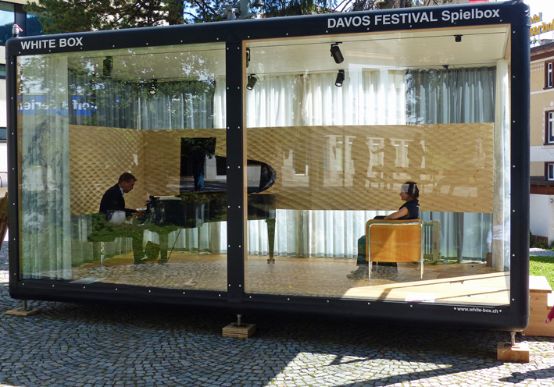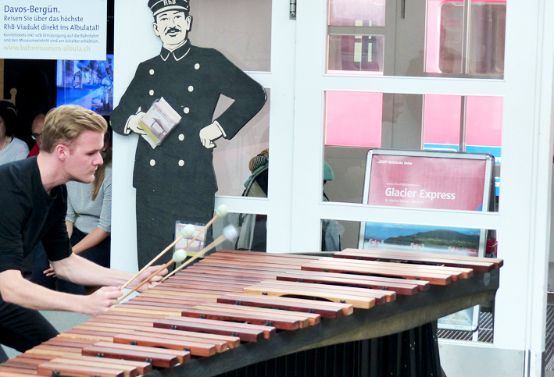The playground as a field for experimentation
As usual, this year's Davos Festival questioned listening habits and introduced new forms. For example, the Spielbox, the smallest concert hall in the world.

The glass door of the concert hall opens. The pianist stands up and greets me personally. From the cards he holds out to me, I pull out George Gershwin's Embraceble You in an arrangement by Earl Wild. Then I take a seat in the only armchair. No one rustles with the program booklet, no one coughs. I am all alone with Benjamin Engeli, who plays the first delicate notes on the grand piano. The world outside the glass is far away.
The undulating chord breaks combine with the milled waves on the wooden wall to form an ocean on which I am happy to drift. The sound of the grand piano, which is just a meter away from me, embraces me until I am released back into everyday life, completely filled with music. A handshake, a few words, then it's the next concertgoer's turn. The so-called Spielbox, which is being used for the first time at the Davos Festival (Young Artists in Concert), has long been a dream of artistic director Reto Bieri - now it has been realized by a local carpentry firm. The glass, soundproofed container with its beautiful wooden floor can be placed anywhere. "Concert halls are getting bigger and bigger, the programs more interchangeable. As a result, the individual musical experience is often lost. In Davos, we now offer the greatest exclusivity with the smallest concert hall in the world," says Bieri. A musician meets an audience member: a personal encounter instead of a mass event. The Spielbox ensures intimacy, directness and often great emotions. Tears have also been shed at these five-minute, free concerts, which can be enjoyed every day between 11 a.m. and 12 noon during the festival on the lively Bubenbrunnenplatz. A total of 32 pieces were composed for the 18 square meter space - from Rico Gubler's dissolving waltz to Fake news by Reto Bieri himself, in which the listener has to act out strong emotions. On Sunday morning, all kinds of appointments are already booked. Nine-year-old Jon Arvid also drops by the Spielbox with his family before a mountain bike tour. "I was a bit nervous, but then the pianist was very nice and told me something about the piece. It was about birds that whistle less at lunchtime." Maurice Ravel's Oiseaux tristes becomes a personal experience of nature for Jon Arvid. The one-to-one situation in the Spielbox is also unusual for pianist Benjamin Engeli. "The listener's reaction is extremely direct - you never get such honest feedback in a concert hall."
Theater play in Kirchner's backdrops
More thought is given to music in Davos than at other festivals. Listening habits are questioned, new concert venues are tried out - whether by the lake, on the alp or in the train station. The annual motto is taken from everyday life. After "Roundabout" and "Family Zone", Reto Bieri has chosen "Playground" as the guiding theme for the third year of his directorship. The name says it all. In the morning concert "Chess moves" in St. Paul's Church, Alexander Boeschoten plays with Wilhelm Zobls Chess Waltz No. 1 a game between Karpov and Kasparov on the piano - the bars of the Strauss waltz are combined according to chess squares. During the long "Homo-Ludens-Night" at the Hotel Schweizerhof, Mozart's composition while bowling meets Kegelstatt trio to Gilles Grimaître's vibrant jazz sonata for solo piano by George Antheil. The Polish ensemble Małe Instrumenty's Chopin performance on detuned toy pianos is somewhat reminiscent of Hape Kerkeling's legendary Hurz performance in its absurdity. But there is also room for nonsense on Reto Bieri's playground, which is always a field for experimentation.
With the 13-member Davos Festival Chamber Choir under the direction of Andreas Felber, a first-class vocal ensemble is available to perform Paul Alpenzellers folk piece The daughter of the Arvenhof (1920; directed by Inge Krichau Sadowsky) with Schubert songs. A guest house was specially built into the Kirchner Museum Davos for this purpose. The painted backdrops are by Ernst Ludwig Kirchner himself, who first came to Davos a hundred years ago and was repeatedly engaged as a theater painter for the local amateur dramatics. The daily, well-attended open singing of the chamber choir has become an integral part of the festival program.
Interludes in the counter hall
A total of 80 young instrumentalists from 20 countries will be on site for the entire two-week festival with a rather modest budget by Swiss standards of 750,000 francs and will perform in various formations, from duets to chamber orchestras. The Frankfurt Aris Quartet will present a highly dramatic, finely branched interpretation of Felix Mendelssohn's F minor Quartet op. 80, while Swiss cellist Chiara Enderle will captivate audiences with her clarity and great expressiveness, and not only in Olli Mustonen's Sonata for Cello and Piano. Mustonen takes center stage as composer in residence with his tonally bound, spiritually tinged, thoroughly playful music and can also be experienced as pianist and conductor.
Bieri's attempts to find a new audience are successful, at least in the ticket hall of Davos station. All the seats are taken before the start. The announcement is made over the station loudspeaker. Even the children sitting on the floor listen attentively to Paul Taffanel's wind quintet. Only one local, who walks past the audience, scowls and mutters "So ä Schissdreck". When the young percussionist Fabian Ziegler on the marimba plays Astor Piazzolla's Libertango comes to life, there is undivided enthusiasm. Even the regular slamming of the toilet door cannot jeopardize this.
-

- Photo: Georg Rudiger
- Fabian Ziegler in the Davos ticket hall
Links to reporting in the Neue Zürcher Zeitung:
Marco Frei: A musician is never finished
Marco Frei: In touch with the future








